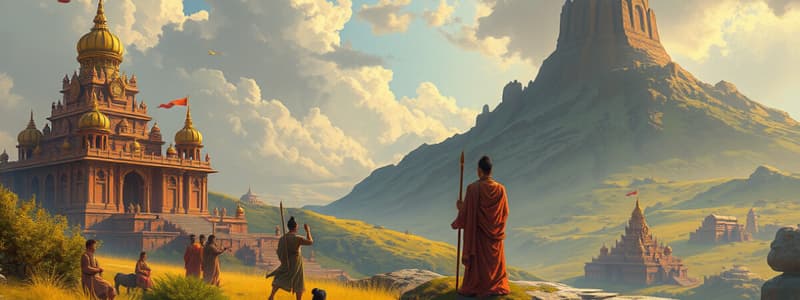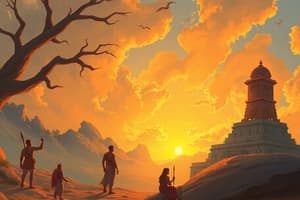Podcast
Questions and Answers
What was the written language developed by the Aryans?
What was the written language developed by the Aryans?
Sanskrit
Where were India's first settlements?
Where were India's first settlements?
by the Indus River
Which Indian god was the creator of the world?
Which Indian god was the creator of the world?
Buddha
What does 'the Buddha' mean?
What does 'the Buddha' mean?
Who were the Aryans?
Who were the Aryans?
What dynasty made Hinduism the official religion of India?
What dynasty made Hinduism the official religion of India?
Who were the Harappans?
Who were the Harappans?
What is Karma?
What is Karma?
What are Vedas?
What are Vedas?
Who did upper caste boys have to teach them?
Who did upper caste boys have to teach them?
During which empire did the golden age of Indian culture occur?
During which empire did the golden age of Indian culture occur?
Which raja conquered weak kingdoms left by Alexander the Great?
Which raja conquered weak kingdoms left by Alexander the Great?
What is a centralized government?
What is a centralized government?
What group used the caste system to rule others that outnumbered them?
What group used the caste system to rule others that outnumbered them?
What system did Buddhism reject?
What system did Buddhism reject?
Which king rejected violence and embraced Buddhism?
Which king rejected violence and embraced Buddhism?
What religion believes all life is sacred?
What religion believes all life is sacred?
What is the first of the Four Noble Truths?
What is the first of the Four Noble Truths?
What does the caste system determine?
What does the caste system determine?
Which Hindu god was the teacher of the world?
Which Hindu god was the teacher of the world?
Which religion believed that the way to stop suffering is to stop desire?
Which religion believed that the way to stop suffering is to stop desire?
What rights did an Indian woman have?
What rights did an Indian woman have?
How would you describe many Indian marriages?
How would you describe many Indian marriages?
What is reincarnation?
What is reincarnation?
Which river empties in the Arabian Sea?
Which river empties in the Arabian Sea?
Flashcards are hidden until you start studying
Study Notes
Written Language
- Sanskrit was developed by the Aryans as their written language.
Early Settlements
- India's first settlements emerged along the Indus River.
Indian Deities
- Buddha is regarded as the creator of the world in Indian mythology.
Meaning of Buddha
- The term "Buddha" translates to "Enlightened One."
Aryan Culture
- Aryans originated from central Asia, engaged in animal herding, and are part of the broader Indo-European group.
Hinduism in India
- The Gupta dynasty established Hinduism as the official religion of India.
Harappans Society
- The Harappans valued a close relationship between politics and religion, living peacefully.
Concept of Karma
- Karma refers to the consequences resulting from a person’s actions and lifestyle choices.
Vedas
- The Vedas are ancient texts consisting of hymns and prayers intended for religious ceremonies.
Education for Upper Caste Boys
- Upper caste boys were required to attend school to become priests.
Gupta Empire
- The golden age of Indian culture occurred during the Gupta Empire, marked by significant advancements.
Chandragupta Maurya
- Chandragupta Maurya conquered the weakened kingdoms left by Alexander the Great.
Centralized Government
- A centralized government is characterized by rulers exercising control from a capital city.
Caste System
- The Aryans employed the caste system to maintain control over larger populations.
Buddhism's Stance
- Buddhism rejected the Varna and Jati systems, opposing caste-based social structures.
Asoka's Leadership
- King Asoka was known for renouncing violence in favor of Buddhism.
Hindu Beliefs
- Hinduism holds the belief that all forms of life are sacred.
Four Noble Truths
- The Four Noble Truths outline the nature of suffering, its causes, and the path to liberation from desire.
Caste System Influence
- The caste system affects one's occupation, marital prospects, and social interactions.
Krishna's Role
- Krishna is revered in Hinduism as the teacher of the world.
Buddhism's View on Suffering
- Buddhism teaches that ceasing desire is essential to overcome suffering.
Rights of Indian Women
- Indian women could inherit property if no sons were present, and traditionally, a widow would leap into her husband's funeral pyre.
Marriage Practices
- Many Indian marriages were traditionally arranged by parents.
Concept of Reincarnation
- Reincarnation involves the belief in a cycle of rebirths to ultimately reach unity with Brahman.
Geography
- The Indus River flows into the Arabian Sea.
Studying That Suits You
Use AI to generate personalized quizzes and flashcards to suit your learning preferences.




